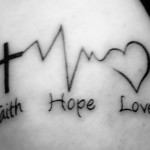My friend Dan Brennan recently wrote a book called Sacred Unions, Sacred Passions: Engaging the Friendship Between Men and Women. I thought this book worthwhile for a few reasons, and foremost of those is that many of the principles and thoughts are generalizable to what it means to be in faithful relationship (non-sexual friendship) with ‘the other’. In Dan’s case he explores that between men and women, and in this blog’s context it’s between same gender persons – whether LGBT or hetero. I asked Dan to write a few posts about some of his thoughts, and thus, he will have a 5 part series on sacred unions of friendship.
Part 1:
“It’s about friendship.
One of my first reactions to reading Andrew Marin’s Love is an Orientation was that he is calling Christians into friendship with those in the GLBT community. Although friendship has been overlooked in much contemporary evangelical spirituality, Andrew’s bold step to follow Christ offers a way of love through friendship that embodies a move past the fears that divide.
In the history of Christian spirituality, friendship is a robust love beginning with Jesus’ declaration, “No one has greater love than this, to lay down one’s life for one’s friends” (John 15:13). This simple statement from Jesus is well known; yet it challenges our cultural notions of love and friendship. Jesus doesn’t say romantic love is the greatest love. Yet, romantic love is the “greater love” for many in our society. In our current world, romantic love, not friendship, and not even marital love, is most celebrated and valued.
I began to explore friendship as a robust love a few years back when a couple of friendships with women started to move out of the detached, way of relating as friends and into more of a complex and committed love. There was one huge issue. I was a married man. There was a second issue. I resisted black-and-white, cut-and-dried evangelical answers that such friendships are inherently dangerous for both me and my friends. My refusal to settle for stereotypical responses led me deep into the mysteries of love, sexuality, spirituality, and friendship.
The meaning of friendship, of course, is so elastic. It can mean the barest of social contacts or it can mean the ultimate in human connection and relationship. Yes, the ultimate. This is what surprised me as I began to explore the meaning of friendship prior to Freud. In twenty five years in the evangelical community, I always heard about marriage and family life (i.e. “focus on the family”). Friendship, whenever it was alluded to, was a relationship peripheral to God, spouse, family, and church. In the evangelical community, I absorbed the implicit message that romantic love (that is, marriage) was the greatest of all human loves.
My thinking on that began to change as I came across stories of friendship stories from the past. I was shocked to discover a deep spirituality of friendship among Christians from past centuries. Passion. Yearning. Happiness. Union. Commitment. Vows. Affection. Oneness. Safety. Trust. Warmth. There was evidence in these friendships for all of them! This was stunning to me. These stories of robust, passionate love in friendship, not exclusively about sex, challenged my previously held presuppositions of sexuality, spirituality, and friendship. I started to wonder why hadn’t I heard about any of this during my twenty five years in the evangelical community? I heard that family values, faithful marital love, hearing the Bible preached, Bible study, and private prayer were essential to one’s spiritual journey. But these friends of earlier centuries communicated the most heartfelt language of bonding, loyalty, and passion one can have in human connectedness, relationship, and spirituality.”
Much love.











